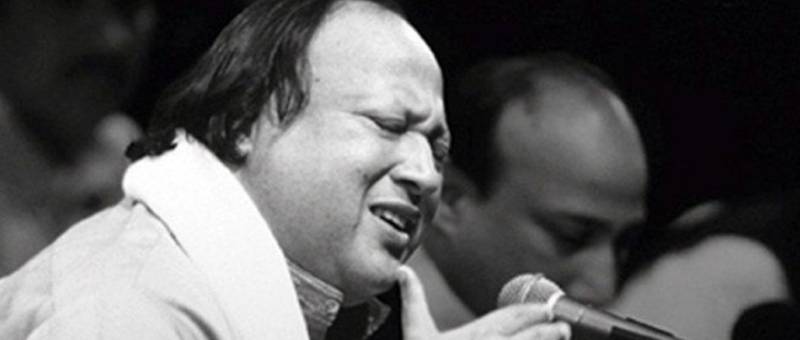Nusrat Fateh Ali Khan - A Look Back At One Of The Greatest Voices Ever Recorded

Singing the devotional music of the Sufis, Nusrat Fateh made his mark during his short lifetime. Coming from a family blessed with proficient singers, it was no doubt that he had music running through his veins. However, Nusrat stood out the most thanks to his heavenly vocals and his ability to perform nonstop for hours.
Although his family had a rich legacy of qawalli music, his father wanted him to become a doctor or an engineer thinking that qawals did not get enough respect or recognition. Little did he know, his son would become one of the most famed qawals of all times. Nusrat kept receiving vocal training and had his first public performance at the age of 16. From then on, it only went uphill. He soon became the head of his family’s qawalli party which was just another step in his long journey of success. Affirming his devotion towards music and singing, Nusrat began to explore his avenues and soon developed his own exclusive style. It was this uniqueness that earned him fame overnight as word about his impeccable voice spread like wildfire.
At an annual music festival organized by Radio Pakistan, he was given the opportunity to perform at a studio recording broadcast called “Jashn-e-Baharan” .This is where he captivated his audience by singing in many languages including Urdu, Punjabi, Persian and Hindi. Eventually his fame spread across borders and he made his way to World of Music, Arts and Dance (WOMAD) festival in London in 1985. Continuing from there he hit the road and started performing extensively, travelling to Paris in 1980s along with receiving an invitation from the Japan Foundation. In 1989, he performed at Brooklyn Academy of Music, New York. At this point his career was skyrocketing, with thousands of fans buying tickets to watch him perform.
Although he had to go on for hours at each show without a break, Nusrat delivered his best each time. It was this devotion that earned him the President of Pakistan's Award for Pride of Performance for his contribution to Pakistani music in 1987 along with being honored with the UNESCO Music Prize in 1995 and the Grand Prix des Amériques at Montreal World Film Festival the next year. Even after his death he was recognized as an inspiration, in August 2010 he was included in CNN's list of the twenty most iconic musicians from the past fifty years.
He sang many songs to boost the morale of his countrymen and induce patriotism along with trying to bring them closer to God though his qawallis. His most popular pieces include “Allah Hoo Allah Hoo”, “Mere Rashq-e-qamar”, “Wohi Khuda Hai” among many others. Not only this but he worked on several albums with international producers such as Michael Brook and Peter Gabriel.
Although he died at the prime of his career due to a heart attack at a young age of 48, his music lives on. We are indebted to the “Shahanshah e Qawalli” for leaving us with amazing music and hope to see his legacy continue for generations to come.
